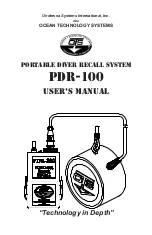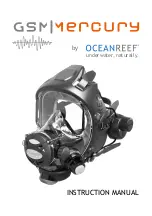
2-6
Basic Operating Modes of the SRS RGA
SRS Residual Gas Analyzer
RGA Windows uses the two modes to generate the data for the Analog and Histogram
Scan Modes.
Analog scanning
is the most basic operation of the RGA as a quadrupole mass
spectrometer. During analog scanning the quadrupole mass spectrometer is stepped at
fixed mass increments through a pre-specified mass-range. The ion current is measured
after each mass-increment step and transmitted to the host computer over RS232. Analog
scanning allows the detection of fractional masses and provides the only direct view of
the peak shapes and resolution of the instrument.
A
Histogram (Bar Mode) Scan
consists of a succession of individual peak-height
measurements over a pre-specified mass range. A single value is used to represent the
peak heights at each integer mass within the range. The peak height measurements are
made with the
Peak-locking
scanning procedure described in the next section. Histogram
scanning is one of the most commonly used modes of operation for the RGA. Its two
main advantages are a faster scan rate than analog scans, and a reduced amount of data
being exchanged during the scan.
The SRS RGA as a Single Gas monitor
The SRS RGA can measure individual peak heights at any integer mass within its mass
range.
This mode of operation is used to generate data for leak testing measurements, and to
track changes in the concentrations of several different components of a mixture as a
function of time. The outputs provided by a set of single mass measurements are often
used in process control programs to control alarms, analog and digital outputs, and relays.
RGA Windows uses this mode to generate its data for the Table, Pressure vs time,
Annunciator and Leak Detection modes.
Peak Locking procedure
: During a Single Mass Measurement the RGA performs a
Miniscan around the mass requested, and the
maximum current value
measured is
sent
out over RS232
. The scanning procedure, referred to as
Peak-Locking
, is designed to
measure peak currents for individual masses in a mass spectrum without being affected
by drifts in the mass-axis calibration. The Miniscan covers a 0.6 amu range centered at
the mass requested, and selects the maximum current from 7 individual measurements
performed at 0.1 amu mass increments.
The SRS RGA as a Total Pressure Gauge
The SRS RGA can measure total pressures.
The RGA might be thought of as a Total Pressure Ionization gauge with a mass analyzer
interposed between the ionizer and the detector. Thus, by disabling the mass-filtering
action of the analyzer section, it is possible to detect the total ion current from the ionizer
and perform total pressure measurements. A total pressure sensitivity factor, stored in the
non-volatile memory of the RGA, is used by RGA Windows to convert total current
measurements into total pressures.
Summary of Contents for RGA100
Page 4: ...SRS Residual Gas Analyzer iv...
Page 18: ...xviii Command List SRS Residual Gas Analyzer...
Page 46: ...2 14 Residual Gas Analysis Basics SRS Residual Gas Analyzer...
Page 66: ......
Page 78: ...4 12 Mass Filter Power supply SRS Residual Gas Analyzer...
Page 104: ......
Page 107: ...Programming the RGA Head 6 3 SRS Residual Gas Analyzer Error Byte Definitions 6 69...
Page 216: ...8 26 Quadrupole filter cleaning SRS Residual Gas Analyzer...
Page 246: ...11 2 SRS Residual Gas Analyzer...
Page 247: ......
Page 248: ......
Page 268: ...Appendix B SRS Residual Gas Analyzer 7...
Page 312: ...Appendix D SRS Residual Gas Analyzer 27...
















































